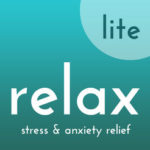All too often, we hear about the negative effects of too much screen time on our health and well-being. However, with moderation, there are many apps that can help monitor and support our mental health. After all, there seems to be an app for everything these days! The following 5 apps have been “therapist tested and approved” and are great tools to support your mental health.

With the Virtual Hope Box app, you can create a portable support kit right on your phone! You can personalize the 5 sections of the app based on your needs:
-
Remind Me: Upload photos and videos of positive memories or things that spark joy
-
Distract Me: Play a built-in game or puzzle
-
Inspire Me: Swipe through uplifting quotes
-
Relax Me: Try a guided relaxation exercise
-
Coping Tools: Create personal coping cards
The app also allows you to upload phone numbers of supportive friends and family–you can call them directly from the app. If you are having a tough moment, simply open the app and choose the category that will help you cope.

The iMoodJournal app functions as both a personal journal and a mood tracker. Set a reminder to log your mood 1-2 times daily and track your mood over time. Beyond tracking your mood, you can also add in sleep, stress triggers, monthly cycles, and other symptoms. After you have added your data for a few weeks, check out your graphs and look for trends to see how your moods rise and fall.

This simple app can help you master the skill of deep breathing. Turn the app on, close your eyes, and listen to the audio cues that signal when to breathe in and breathe out. As you get better at the skill, choose from more advanced levels that gradually reduce your breathing rate. Practicing deep breathing has many benefits, including:
-
Increased relaxation and focus
-
Reduced levels of anxiety
-
Decreased blood pressure and heart rate
-
Increased ability to fall asleep
-
Assistance with pain management, including headaches and migraines

Headspace (Free for Basic App or Monthly Fee for Full Access)
The Headspace app offers a limited number of free guided meditations and mindfulness techniques, but has a comprehensive library of options if you choose to pay the monthly fee. The best FREE feature of the Headspace app is found in the “Sleep” section of the app. Check out the “Sleepcasts” which are guided stories that relax your body and help you fall asleep. It is hard NOT to fall asleep when you listen to a Sleepcast!

Done: A Simple Habit Tracker (Free)
Are you motivated by progress? The Done app is a simple habit tracking app that helps you create healthy routines in your life. Set your goals, track your progress, and get motivated by creating positive streaks. The Done app can help you set goals in which you both build and quit activities (ex: drinking more water or drinking less coffee). You can track several goals at once and view your trends over time with motivating progress graphs.
Let us know if you try out any of the apps or if you have additional apps you would recommend to support mental health!

